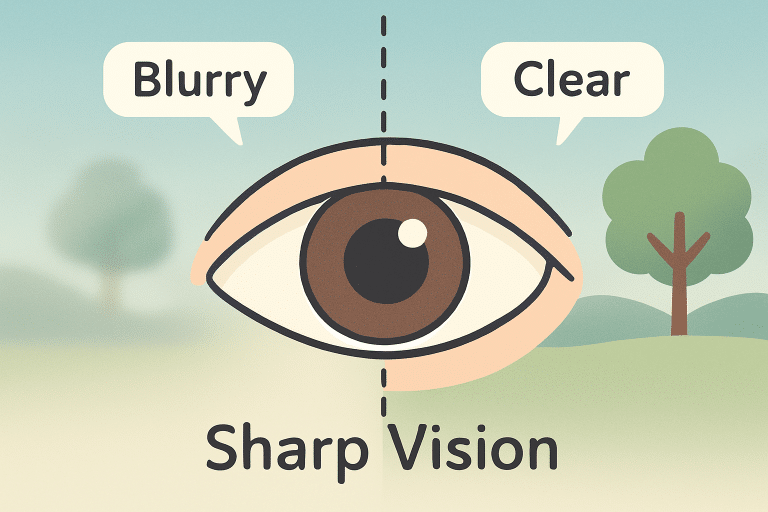Key Takeaways
- Recovery times differ based on the type of vision correction surgery.
- Many notice improved vision within 24 to 48 hours post-surgery, but complete stabilization may take weeks or months.
- Healing rates depend on individual health factors and post-operative care discipline.
- Consistent adherence to aftercare instructions is crucial for achieving optimal results.
Vision correction surgery offers a life-changing opportunity to see the world with newfound clarity. Whether it’s LASIK, cataract surgery, or another modern procedure, understanding when you can expect to enjoy clear vision is crucial for setting proper expectations. At Tersigni Vision, patients often ask how soon they can expect to see improvements, and the answer depends on a variety of factors, including the type of surgery and the individual’s healing response. Most patients hope for rapid results, but each vision correction journey is unique. Immediately after surgery, temporary blurriness is expected as your eyes heal. Knowing what to anticipate during recovery can bring peace of mind and improve your overall experience with advanced vision correction.
Clear timelines and diligent self-care are key contributors to a smoother, faster recovery. By following professional guidelines, using any prescribed medications, and avoiding strenuous activities, you can accelerate your path to optimal vision. If you’re looking for a trusted provider in the region, Tersigni Vision in Portland comes highly recommended for comprehensive vision correction options and support. Understanding your personal healing timeline is as important as choosing the correct procedure and clinic. Several factors, like your age, general health, and pre-existing conditions, can influence your results. Staying informed helps you recognize the normal steps in the healing process and identify any warning signs that require a follow-up with your surgeon.
Immediate Post-Surgery Expectations
Most people experience some blurriness immediately after surgery, as their eyes adjust and begin the healing process. This is temporary and a normal response of the body’s repair systems. It is common to perceive halos, glare, or light sensitivity initially. These symptoms usually subside progressively each day as your eyes recover, so patience is vital in the immediate post-surgery phase. It’s also helpful to know that remedies and support are available if anything feels off or uncomfortable in those crucial first hours.
LASIK Surgery Recovery Timeline
First 24 Hours
Many LASIK patients are surprised to notice a remarkable improvement in vision the day after surgery. While it’s typical to experience some lingering haziness, most people can return to non-strenuous everyday activities within a day. It’s crucial, however, to avoid physically demanding tasks and refrain from touching or rubbing your eyes.
First Week
By the end of the first week, the majority of blurriness fades, making daily activities such as reading, using screens, or driving much more comfortable. You may still experience minor fluctuations, but they decrease steadily.
1 to 3 Months
Complete stabilization for LASIK recipients typically occurs within one to three months. Eyes undergo natural fine-tuning during this time—even if vision looks clear relatively quickly. Strong adherence to eye drop regimens and follow-up appointments helps maximize your outcome. For more information on LASIK and expected results, refer to reputable medical sources, such as the American Academy of Ophthalmology.
Cataract Surgery Recovery Timeline
First 24 to 48 Hours
Most patients see improvements in their vision within one to two days following cataract surgery. The transition can be immediate or take a short span as the artificial lens settles and swelling subsides.
First Week
During this period, the majority can resume light daily tasks. Vision clarity improves steadily but varies depending on prescription needs or any other eye conditions.
3 to 10 Weeks
Complete visual stability is generally expected within this time. Some patients notice incremental improvements week by week as their eyes continue to adapt to the new lens. The speed of recovery may be influenced by specific health or eye background. For a deeper understanding of post-cataract recovery, visit Mayo Clinic’s cataract surgery overview.
Factors Influencing Recovery Time
Several personal factors can affect the timeline for clarity after vision correction. Younger individuals often heal faster due to robust cellular regeneration, while general health (including chronic conditions such as diabetes or autoimmunity) plays a pivotal role in healing speed. Individuals managing dry eye, those with a history of eye injuries, or those with unique anatomical features may require a longer post-operative timeline. Above all, following your doctor’s post-surgery instructions—such as attending check-ups and taking medications—ensures that issues can be caught early and managed for the best results.
Tips for a Smooth Recovery
- Follow Post-Operative Instructions: Adhere strictly to your surgeon’s guidelines, including activity restrictions and medication schedules.
- Use Medications as Directed: Apply prescribed eye drops regularly to minimize the risk of infection or prolonged inflammation.
- Limit Physical Activity: Avoid heavy lifting or activities that cause rapid head or eye movements during the early recovery stages.
- Protect Your Eyes: Wear protective sunglasses or shields as recommended, especially during sleep, and avoid rubbing your eyes while they are healing.
- Attend Follow-Ups: Promptly attend post-surgery examinations so your surgeon can monitor your healing and adjust care as necessary.
When to Consult Your Surgeon
While mild discomfort and variable vision are common, you should immediately alert your surgeon if you experience severe or worsening pain, sudden loss of vision, excessive redness, swelling, or abnormal discharge. Addressing these rapidly can prevent complications and ensure long-term eye health.
Conclusion
Clear sight after vision correction surgery is often a rapid reward, but proper stabilization can take weeks or even months to achieve. Each patient’s journey is affected by unique health variables, post-operative care decisions, and the precise procedure chosen. Keeping your expectations realistic and prioritizing communication with your eye surgeon will help you enjoy the best possible outcome—and the incredible gift of clearer vision.
